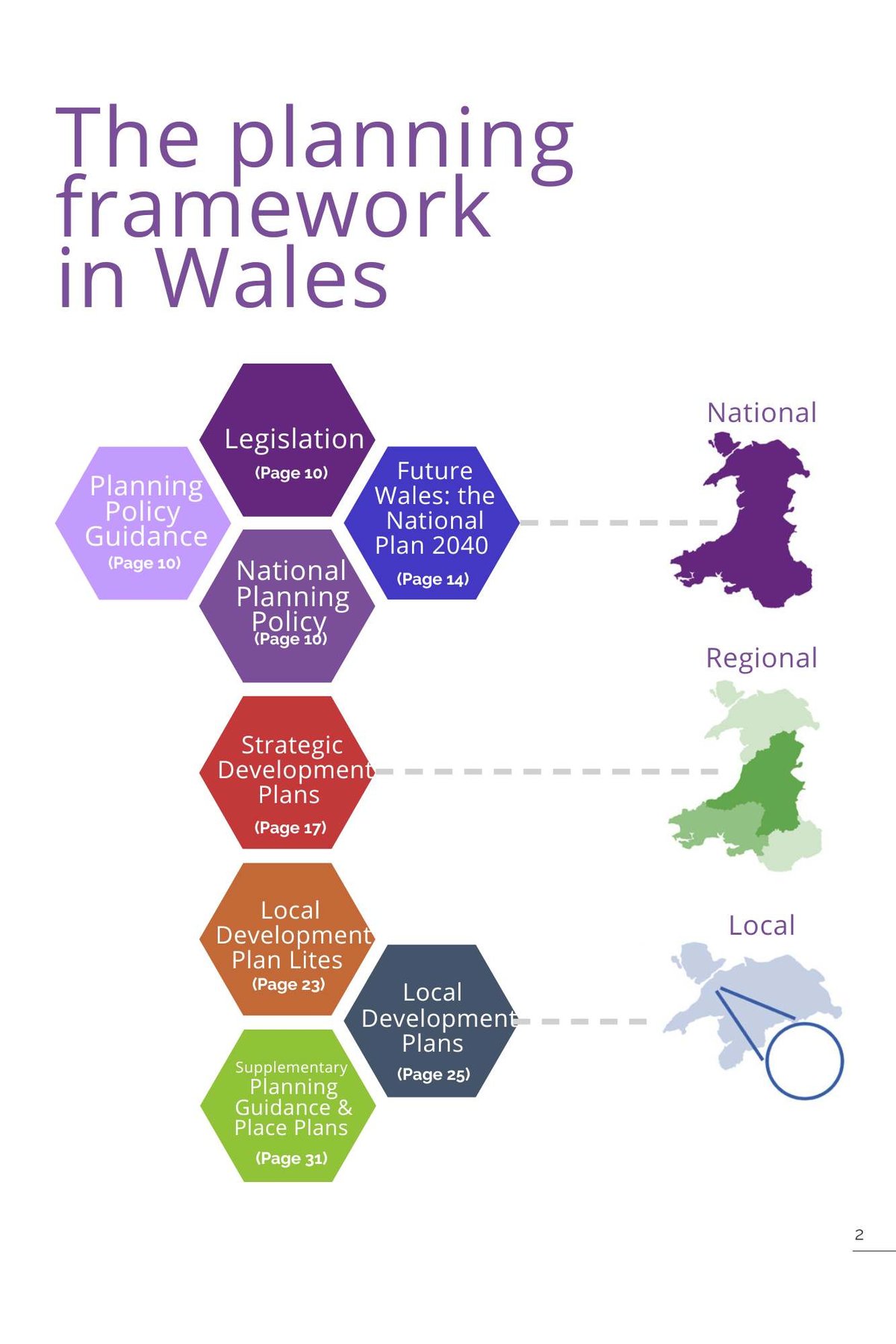The Welsh plan-led system – is it delivering?
As housing supply in Wales continues to nose dive, with 2023/24 seeing the second lowest number of new homes completions recorded since data collection began, the Home Builders Federation’s Planning and Policy Advisor for Wales, Mark Harris, explores what the problems are with the planning system in Wales, and how the production of Local Development Plans can be sped up.
Although HBF is supportive of the plan-led system in principle - as when operating correctly it provides certainty for developers around longer-term planning and housing delivery - in practice this system is delaying, and will continue to delay, the delivery of new homes in Wales.
Local Development Plans
The idea of a plan-led system is not a new one. Since 2004, each local planning authority (LPA) in Wales has been required to produce a new-style Local Development Plan (or LDP). At the time, LDPs were described as shorter and more concise than the Unitary Development Plans (UDP) and local plans that preceded them. It was also believed that they would take less time to prepare.
The purpose of LDPs is to set out each local planning authority’s proposals for future development and the use of land in their area, including setting a housing target based on evidenced need and allocating land for this housing. Once LDPs are adopted, they form the basis of planning decisions that the local planning authority makes.
It took until 2011 for the first LDP to be adopted, with a number following over the next few years. Full plan coverage of LDPs across Wales (25 LPAs, including three National Parks) was finally achieved in December 2023, some 19years later, when Wrexham’s LDP was adopted (although it is still subject to two Judicial reviews).
LDPs are meant to cover a period of around 15 years and should be replaced once time expired. They must also be reviewed every four years. Currently, however, 11 LDPs are time expired and only seven are less than five years old.
Delays in progress on reviewing LDPs were in part caused by the pandemic, which resulted in a number of LPAs having to review their evidence base to ensure it was up to date, and some deciding to go back a stage. Guidance issued by the Welsh Government in September 2020, during the pandemic, clarified that LDPs remain active until they are replaced by a further LDP:
‘Plans adopted prior to 4 January 2016 will remain the LDP for determining planning applications until replaced by a further LDP.’
Delays have also been caused by a lack of resources within LPAs and, in more recent years, the Welsh Government has delayed progress in updating LDPs by intervening in four plans (Monmouth, Newport, Caerphilly and Rhondda Cynon Taf), stating that:
‘The plans were considered to not be in general being in conformity with Future Wales 2040 and unlikely to satisfy the tests of soundness, as set out the Development Plans Manual (DPM) Edition 3 (March 2020).’
HBF wrote to Julie James in February 2023 regarding these interventions, raising concerns at the additional delay that it would cause to the adoption of up-to-date LDPs. Her response stated that ‘intensive consideration’ had gone into assessing the plans and their ‘conformity with Future Wales 2040'.
A plan-led system is a cornerstone of placemaking and delivering on key national priorities to address climate change, deliver affordable housing, protect and enhance our biodiversity, as well as improve people’s quality of life.
However, it is equally important that inappropriate development, both in terms of scale and location, is not allowed in LDPs that is contrary to, or even undermines, Future Wales 2040 and PPW.’
The future of the plan-led system in Wales
In 2021 we saw further changes to the plan-led system in Wales, with the introduction of two additional tiers above the LDP.
Firstly, Future Wales: the National Plan 2040 was published by the Welsh Government in February 2021. Future Wales identifies three National Growth Areas where there will be a focus on promoting strategic housing: Cardiff, Newport and the Valleys.
Secondly, Strategic Development Plans (SDPs) which will consider regional issues. At the time, it was expected that work would start on these in 2022. However, two years on little progress has been made - with the earliest SDP expected to be adopted in 2030, six years from now.
SDPs will consider the following strategic issues relevant to the region.
- The scale and location of housing and employment growth
- Strategic housing and employment development sites and their placemaking principles
- Strategic Green Infrastructure routes
- Transport infrastructure
- Identify areas of proposed new green belt

The planning framework in Wales, Development Plans Community Guide, Gov.Wales
Once the SDP is adopted, LDPs will be replaced with simplified ‘LDP lights’. However, these can’t start until after the adoption of SDPs and, based on current SDP timescales, there is a chance that LDPs currently under review may have to be looked at again before this happens.
In addition to all of the planning documents discussed above, there is a requirement for the Corporate Joint Committees (CJCs) to produce Regional Transport plans. The first of these is due to be adopted ahead of the SDP in 2027. The importance of this document in shaping an SDP is yet to be seen. But in theory, due to the growing need to provide new homes close to sustainable public transport, they are likely to play a key role. It is also not clear how they will influence LDPs currently under review.
What does this mean for the delivery of new homes under the plan-led system in Wales?
As data shows, the ultimate implication of Wales’ knotty plan-led system is a drop in housing supply. But let’s explore the contributing factors:
- In the short term, because of an increasing number of out-of-date LDPs, there is a shortage of ‘deliverable’ allocated sites, resulting in less homes being delivered.
- The former Cabinet Secretary Julie James was very clear that all development should be plan-led rather than developer-led, making it high risk to try and take unallocated sites through the planning or appeal system.
- Although technically Wales has full LDP coverage this took 19 years to achieve, and nearly half of the plans are now past their end date.
- Since the TAN1 was revoked in 2020 there has been no requirement to calculate a housing land supply, making it very difficult to progress sites which are not allocated in LDPs, particularly at appeal.
- Progress on plan reviews is very slow with only five at preferred strategy stage and some still two to three years away from being adopted.
- The former Cabinet Secretary, Julie James, said ‘the steps we are taking to strengthen the resilience of planning services will help speed up this process’ of LDP production - however it’s not clear what these steps are and when they will happen.
- Only one of the last five plans submitted to Welsh Government at preferred strategy stage didn’t receive a strong objection. Site allocations have been questioned as well as a lack of evidence to support regional collaboration.
- The lack of an SDP makes it difficult to consider regional issues such as the green belt.
- The growing trend in LDPs to allocate a small number of larger sites makes it even harder for SME builders to operate in the plan-led system.
What are the issues faced in speeding up the delivery of up-to date-plans?
There are a number of constraints to plans being delivered at the pace required, including:
- The review of a LDP is an incredibly resource-heavy process, with an ever-growing number of detailed background papers required to support the deliverability and sustainability of the plan. LPAs are often ill-equipped to handle this, with local authorities’ net planning expenditure falling by 50% since 2009-10.
- Increased levels of both public consultation and submitted comments from the public in response are adding to this workload.
- The need to produce SDPs is likely to divert staff (via secondment) away from the production of LDPs.
- Increased regularity of updates to national policy (Planning Policy Wales) results in the need to review the evidence base.
- Increased levels of intervention from Welsh Government.
HBF members’ role in the plan-led system
Home builders in Wales continue to engage in the LDP review process, including submission of candidate sites, which requires significant front loading to ensure the site is deliverable and viable. This is a costly process that takes many years and comes with considerable risk as there is no guarantee that any site will be allocated in the plan.
What can be done to deliver an operational plan system?
There are a number of interventions that could improve the operability of the planning system in Wales:
- Investment in improving the resources of LPAs.
- Ensuring the timely review of LDPs, including monitoring and enforcement of plan production by the Welsh Government.
- Ensuring work on SDPs doesn’t delay LDP work as a result of officer secondment.
- Reinstating TAN 1, allowing sustainable unallocated sites to come forward where there is a proven lack of land supply and housing need.
- Introducing an all-Wales Government housing target to incentivise open market housing delivery.
HBF members want to work in a plan-led system, but currently it is taking too long to update the large number of out-of-date plans. There also needs to be an alternative method to allow homes to be delivered where a plan is out of date.
The current issues with the plan-led system are highlighted by the latest Welsh Government data, which shows that last year saw the second lowest number (4,754) of new home completions since 1974/75 - well below the 7,500 needed as suggested by Future Wales.
If your organisation has HBF membership, you can help shape our activity by joining our Wales Planning and Technical Groups.
